Jan Carson's Blog, page 11
November 13, 2016
Talented Friends : Andy Eaton

This is my good friend Andy Eaton. Andy is an American but you’d hardly even know this to look at him. He has spent so much time in Belfast, and done such a good job of tolerating/understanding/replicating all our odd little Northern ways, he is now considered one of us. I have known Andy for about seven years. We almost studied together at St Andrew’s, missing each other by a handful of months. Then, we shared a draughty, big house for a year. Then, we shared a mouldy, small house for a year. Then, he went and married my good friend Holly and moved here permanently, so I guess we’re going to be friends for a very long time to come.
Last week Andy launched his first pamphlet with The Lifeboat Press. It is a handsome little china blue book, containing four shorter poems and a long poem to finish. I brought it with me for a weekend in Dublin and finally got time to sit down and enjoy it with a glass of wine yesterday evening. I’m loathe to write on a book this pretty but there are so many individual lines and sections I wanted to highlight. So many thoughts I wished to jot down and return to later. It is the sort of collection that gets under your skin and itches in a good way.
A lot of my friends write poetry. Sometimes I like their poems. Sometimes I say I like their poems but I really haven’t a notion whether they’re any good or not. This is not the case with Andy Eaton. I’ve always known Andy was a remarkable poet. He approaches language, both spoken and written, with the kind of care which suggests reverence. He knows how to handle a word well. Andy’s poems have been making me cry for about five years now. They are, in places, comparable to prayer, if my prayers were not constrained by hard learnt rules and form, if they weren’t so much about me. As a sometime writer of magic realism I am always drawn to writing which attempts to capture the ethereal, the unsayable and the mysterious in solid words. Andy Eaton is incredibly good at pinning down the sublime. No, that’s not quite right. The sublime is never made static or concrete in any of his poems. Instead it is given room to breathe. It is allowed to hang there, unresolved and open to interpretation. I’ll steal a line or two here from one of my favourite of Andy’s poems, Recollections from the Book of Wind and Brass: “The Book is quiet on the subject of what to do/ when the dead do not keep silent. This is the idea/ of Wind, combined with the idea of doing nothing.”
Even language is not treated as a fully formed absolute in Andy’s poems, “when my father comes into the shed,/ they try to find their way around each other/ with the small and quiet lamp of language.” The meagreness of humanity and humanity’s attempts to console itself, to find meaning and forge relationships are at the heart of Andy’s poems, also the hope of finding beauty in the most broken situations, perhaps most notably so in his poems which focus on his grandfather’s internment in a Prisoner of War camp, “It’s/ that bold tenderness of two men trying/ to be more that what would make them.” People in Andy’s poems are flawed but they are also, “little saviours,” driving themselves beyond the limits of their humanity to try and live well despite circumstances. This is not something which can be said directly, only alluded to, hinted at, told in parables and tiny, fragile glimpses. Such beauty requires a light touch. It is flighty and as easily ruined as the fallen sparrows of the collection’s final poem. Andy Eaton knows how to hold the possible lightly. He lets the words speak for themselves. This is just about the hardest and humblest thing a writer can do.

Andy Eaton’s Sprung Nocturne is the second in a series of Poetry Pamphlets published by the Lifeboat Press. It is available from No Alibis Books and other good book stores and online at www.lifeboatbelfast.co.uk
Andy Eaton was born in California in 1981. Poems have appeared in Copper Nickel, Narrative and Poetry Ireland Review.


November 5, 2016
Postcards from Positive Ageing Month- Week Four
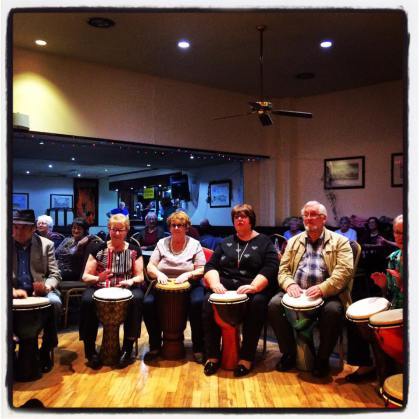
October 22nd – Dundee
Zosia Kuczynska
It is three years since William died.
“Time to move on,” said my good friend Sandra, and booked a fancy hotel for the weekend. “You’re still youngish,” she said. “You still have most of your figure. You never know who you might meet this weekend.”
She made me wear leather look leggings. She dragged me on to the dance floor and, against my better judgment, got me dancing. She forced me to accept a series of gin and tonics from a young lad in an Abercrombie top. “Have a bit of sense,” said I, under my breath, but Sandra just smiled and winked viciously.
Later, on the way back up to our room, the lift stopped suddenly. I went over on my black stiletto boots and it was an older man in a dinner suit who saved me from falling.
“Are you alright, my dear?” he asked, his arms still full of me. “Can I buy you a drink for the shock?”
He was not wearing a wedding band and I knew Sandra was quietly noting this and the expensive shine on his shoes. So I said, “thanks so much, but I’m absolutely wiped out,” quickly and climbed out of his arms because this man was too old and the other man had been too young and I was not yet sure where I fit without William, who’d been just right.
October 23rd – Dundonald Asda
Carrie Davenport
There is an elderly lady in front of me in the line for the self scanner check out at Asda. She is buying dog food and cornflakes and strawberry iced doughnuts in a cellophane box. She takes her sweet time turning each item round and round in search of a barcode and smiles after every individual blip. Zlink. Zlink. Zlink goes the check out machine. There is something in the was she swipes and reaches for the next item which makes me wonder is she actually wants any of this stuff, or if she’s here in Asda on a quiet Sunday afternoon for the sheer joy of making the machine sing.
She reaches foe a plastic bag of peppers: red, orange and racing green, all the colours of the traffic light spectrum. There is no barcode for peppers. When she keys in three yellow peppers I want to say, “stop right there! Red peppers are different from yellow peppers. They’re more expensive.” But I don’t. It’s not theft when you don’t know that you’re stealing. It’s not wrong at all.
October 24th – No Alibis Books
Owen McFadden
Tonight my grandson is staying over. He is sleeping in the spare room next to the hotpress. I have shifted the cat from her usual spot to make room for him in the bed.
“Granny, can the cat sleep with me tonight?” he asks and I say, “no,” and, “no,” and eventually, when his big sad eyes begin to melt me down, “yes, ok, but only for a while, just ‘til you drop off.”
My grandson demands a bedtime story. He has brought a selection from home: something with robots in it, and The Gruffalo, (which I recognise from his backpack), and The Tiger Who Came to Tea.
“I read this one to your daddy when he was a wee boy,” I say and, unable to reconcile the idea of his fully grown father with that of a small child, he looks at me like I am gone in the head.
“You did not, Granny,” says he and I don’t argue with him.
Instead I slide under the duvet next to him, half my backside hanging over the mattress edge, and I turn the pages slowly, allowing him to read along from memory. The smell of him is so familiar, the press of his warm, little body tucked under my armpit, a kind of felt memory, and I wonder where all those years have gone to and why I am not even the smallest bit sad, just grateful for another outing with that old tiger and his insatiable appetite.
October 25th – The Mac
Jacqui Fraser
The retired ladies’ book club meets once monthly in the conference room of the Linenhall Library. Weather and mini-break dependent, there are between eight and twelve ladies in the group. They begin at ten with tea and fancy biscuits. Responsibility for provision of biscuits rotates round all twelve registered members though Marbeth is exempt on account of her diabetes. It is widely understood, but never explicitly stated, that biscuits should be purchased from Marks and Spencer’s, or at very least, the Finest, section of Tesco’s. Lidl biscuits are not tolerated at the retired ladies’ book club.
Meetings start at ten and end promptly at twelve when the room is required by the retired men’s historical society. Passing in the corridor the two groups do their best to avoid each other and rarely make eye contact, though some of the retired book ladies are, in fact, married to the retired, historical men. In 2005 a well-meaning young librarian made a misguided attempt to unite the groups for a one off historical fiction conference. Quickly seeing the error of her ways, the well-meaning librarian now focuses her attention on books and stays well clear of people. The retired ladies’ book club fully understand her position. They too enjoy books more than people and sometimes secretly wonder what the Hell they are doing in a book group listening to the bookish opinions of other retired ladies.
October 26th – The Buffs Club
Todd and Joe McEvoy
Every Tuesday and Friday I play bingo in the community centre at the end of the street. I have my own bingo pen and a lucky badge which I wear pinned to the lapel of my cardigan every time I play. The badge says “Seventy Years Young!!” in gold, glittery letters. It is as big as the mouth of a tea cup. I am not seventy years young any more. I am almost eighty but I have been wearing my lucky badge every time I play bingo because the first night I wore it –two weeks after my seventieth birthday- I won fifty pounds. For real. And Maureen said, “that there badge is a lucky charm,” and Margaret said, “don’t you be playing bingo again without it,” and I haven’t. I have not won fifty pound, for real, since. But, every third week or so I’ll pretend to have a line and, when the man comes over to our table and sees my two fat ladies and keys to the door aren’t exactly where they should be, I’ll look up and him with big dottery eyes and maybe drop my pen and he won’t have the heart to keep the tenner from me. “Dear love her,” he’ll mutter as he walks away and I’ll be ten pounds the richer for it.
October 27th – The Spectrum Centre
Cathryn McCarroll
Tonight you’re serving beef. Nothing fancy: just a wee bit of stewing steak done with carrots and onions in the slow cooker. On the side you serve potatoes boiled in their skins, peel curling away from each spud like the brown of a dry onion.
“There’s wine,” you say, “help yourself,” and nod your head towards a bottle of red, sitting in the middle of the table, brown sauce and ketchup propping it up on either side.
You’ve not got proper wine glasses so we’re using the same tumblers we take our breakfast juice in. The wine is a particularly potent breed.
“What sort of wine is this?” asks Dad.
You look at him, all down your nose and sniffy, like you are that woman with the tight hair on the television wine programme.
“It’s nice, isn’t it?” you say and Dad, being more of a pint and chaser kind of man, doesn’t not know what to say. “It’s the same wine they give out in church,” you say, “for communion. I thought it’d go nice with the Sunday roast. The vicar told me where to buy it. It’s not the sort of wine you can just pick up in Tesco. It’s not for every day.”
October 28th – The Ormeau Road
Sarah Hesketh
Our mother was a great one for the photographs.
Every birthday, every Christmas, every weekend run to the seaside, out would come the camera. Snap. Snap. Snap and we’d be caught in paper crowns and Sunday frocks, ice cream cones dripping, tipping our wine glasses to the camera, squinting –always squinting- in anticipation of the bold flash.
Our mother printed all her photos out and kept them in huge leather bound albums. 1979. 1980. 1981. The sepia beginning to seep out at the corners so we were all a little jaundiced about the face. Weddings. Christenings. Outings to the shopping centre Santa Claus. She liked to file her photos in chronological order. Turning the pages of her albums she’d age each of us from belly bump to birth, then big school and babies of our own.
When our mother died we went through her albums for the memories. We were hankering after the kind of sadness which is warm and well-intentioned. Every sixth or seventh photo was missing. Pure white rectangles marked the places where our earliest faces had once been.
Later, we’d find ourselves pinned to the inside of wardrobe doors, in drawers and biscuit tins, and tucked inside the pockets of her mohair cardigan. Waiting, just waiting, to remind our mother of all her forgotten blessings.
October 29th – The MAC
Anne Ross
The dress looked fine in the changing room.
She let the mirror talk her into it, and the shop assistant who said, “nonsense, there’s no such thing as too young anymore. If you’ve got the figure you should flaunt it,” and other, well-worn platitudes.
Back home the dress seemed too short when she stood up and, when she sat down, clung to the extra fold of belly which had lately rolled its way into the space between her actual belly and her breasts. She thought maybe she could get away with the dress over leggings and then wondered about wearing it with a sloppy cardigan. But it wasn’t the sort of dress you could diminish. It required wearing with your head held high and your heels higher and perfect, strutting posture.
She’d seen ladies, older than herself in dresses much shorter and lower and more inclined to skim the hips neatly and this was the excuse she held against herself as she slipped the dress off its hanger and over her shoulders and down to dinner with the neighbours and her husband who, when he first saw her coming down the stairs, smiled like a trained monkey- all teeth and tightness about the face- and later whispered in her ear, it’s a bit young for you, is it not, Pet?”
October 30th – Belmont Road
Anna Gale
The girl standing next to me at the bar reminds me of a lady I once worked with. We were both in marketing. The year was 1978. Therefore the girl standing next to me at the bar, nursing a long gin and tonic, cannot possibly be the lady I once worked with, in marketing, back in 1978. She is simply too young. I smile at the girl. She smiles back. I am too old to be perceived as any kind of thread.
“Hi,” I say and she, “hi’s” me right back and the similarity is uncanny. It’s round her eyes and in the way she inclines her head slightly when I smile.
“Listen,” I say, “I know it’s odd. But is your mum Sandra. Did she ever work in marketing?”
“No,” says the girl, “my mum’s Louise,” and all of a sudden the bar is too small for us both to be standing there, leaning into our drinks. Blushing. We turn away from each other. Back to back now, I hold the coldness of my pint glass in both hands like it is a kind of crutch. I listen to the sound of her laughing me softly into her boyfriend’s ear. This is the exact moment when I become old.
October 31st – Belmont Road
Hilary Copeland
We do not celebrate Halloween in the nursing home.
Mrs. Matthews in the room opposite mine was once married to a Free Presbyterian minister. Though her husband is now dead she will not allow the Devil so much as a pumpkin-sized foothold in the building. This, I point out to the care workers, is not fair.
“It’s not a democracy,” I say, “if one holy Joe says no and all the ordinary folks say yes, and the minority still holds sway.”
“Welcome to Belfast,” say the care workers. None of them are from here originally and I am amazed that they have picked up the local humour so quickly.
“Stuff Mrs. Matthew,” I say, “I’m celebrating Halloween anyway.”
I dress myself up as a ghost in faded nightgown and white cloud hair, and I pale my cheeks and sit in the corner of the day room all afternoon, going “woooo, woooo,” at the visitors with my hands waving about a little. No one says anything. No one seems to realise I am celebrating Halloween. Yet they keep their distance and I tell myself they are scared.


October 28, 2016
Positively Positive Ageing Month
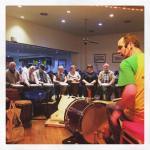


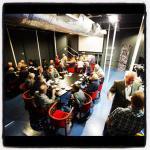
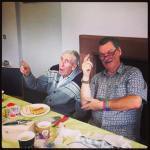
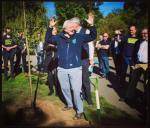
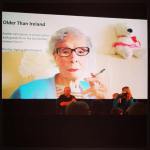



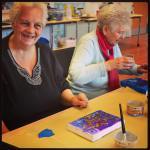
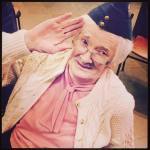
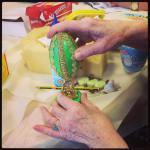
I’ve just finished my final event of Positive Ageing Month. It was, unsurprisingly enough, a tea dance in a community centre with lovely tray bakes and a bit of a knees up to the Hokey Kokey at the end. I’m pretty sure I’ve now reached my saturation point for lovely tray bakes and free tea bags and slushing round the dance floor to “Show Me the Way to Amarillo.” I. Am. Exhausted. However, I am also happy in that strange kind of post-brilliance, peaced out way I only ever experience after I’ve launched a book or run a really good event. I am high on happy old people, (and possibly also the thousands of tea bags which I’ve been carting round Belfast for the last four weeks).I want to sit in a quiet room, smiling to myself whilst thinking about all the wonderful things which have happened in October. There have been far too many to remember so I’ve gathered up some of my favourite photos from the 200 or so events which made up Positive Ageing Month just to remind me of all the individual magic moments.
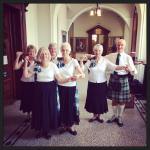
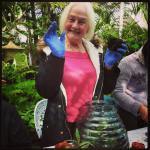

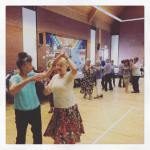


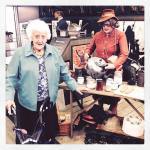
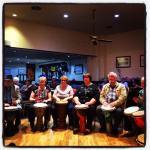
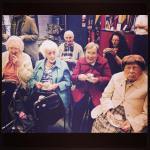
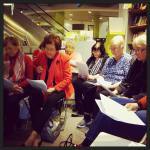
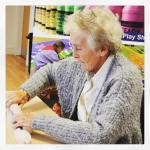
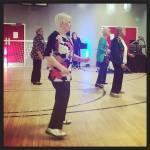
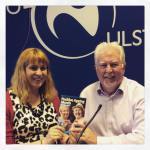
We’ve had drum circles, chocolate tasting, conservation work with Sir David Attenborough, guided tours a plenty, more tea dances than my feet could cope with, outings on the train, crafting, painting, singing, cinema, Slipped Disco, (Belfast’s first ever club night for Senior’s), budding romances, writing workshops, talks, lectures and readings, storytelling sessions, duets with Hugo Duncan, gardening, knitting, sewing and swimming, cycling lessons for those who’ve forgotten how to cycle and computer classes for those who’ve never computed before, massages, yoga, pilates and beauty treatments, dozens of go’s in the photo booth with funny hats on and hundreds of caramel squares, pints and cuppas and sausage rolls, ballet classes and museum visits, jazz and jiving and dear only knows how many rounds of bingo, (though I’ve not won so much as a single line), scones, songs and so many renditions of Country Roads Take Me Home we’ve all started humming it in our sleep.
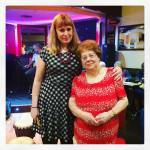
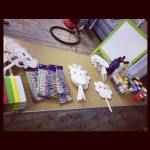

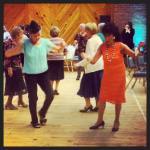
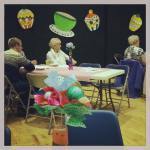
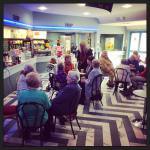


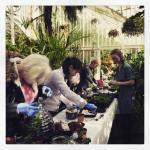
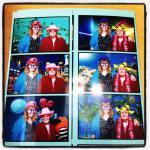
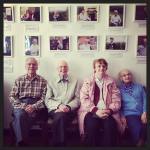

When I think back over the last few weeks the word which keeps coming to mind is joy. Joy isn’t usually the first word which comes to mind when we think about older people and provision for our seniors. Mostly, when it comes to this topic I hear words like strain and burden and duty and other such heavy-handed sentiments. However, Positive Ageing Month has been absolutely full of joy from start to finish, (with a few small exemptions mostly involving tea shortages and tired staff members).

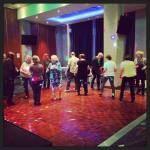
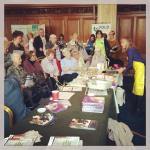
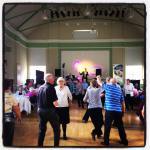
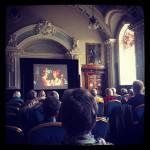
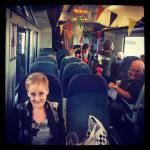
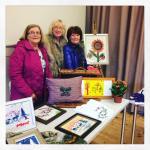
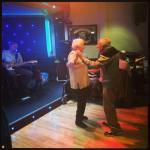
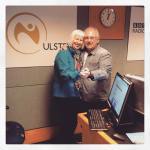

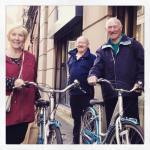

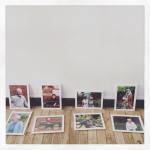
I’ve seen so much joy in the way Belfast carers serve and encourage and care for their older people. At a time when care staff are often criticised and almost always under resourced, it’s a real joy to see smiling, enthusiastic nursing home and fold staff members on the dance floor with their older people, laughing, singing and enthusing about how wonderful their residents are. I run events for older people once or twice a week at most. These folk love and support our seniors day in, day out, often for a lifetime. They are incredibly inspiring people to be around.I’ve also been astounded by the joy which comes when older people are challenged to try something new, something a little out of their comfort zone –drumming, circus skills, writing, getting on a bike- and find they actually thrive on having experienced an activity which is a little different. So often we dumb down our provision for older people. We offer them the dregs of what’s left in terms of resources for arts and cultural participation. We expect them to be content with the same old, same old, delivered in an increasingly lacklustre fashion. It has been a joy, a real joy, to offer our older people hundreds of different eclectic options for getting involved this month and a further joy to see them thrive and grow more confident with these experiences.
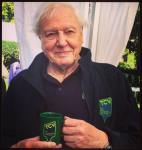
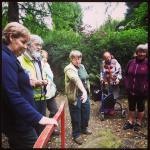
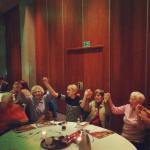
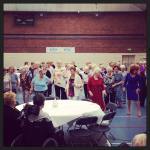
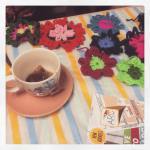


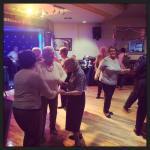
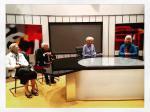
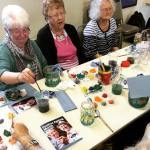
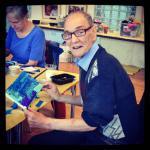

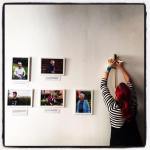
Which leads me to my final observation about the last month. It has been the biggest joy of all to watch many of our older people blossom over the last few weeks. We saw a huge number of people take brave steps to get involved with our activities despite recent bereavement and loneliness and illness. It’s no joke trying something new when you’re in your 70s or even older, especially if you have to embark upon this new experience on your own. The joy of watching these individuals become part of our community of older people, make friends, grow in confidence and perhaps even take their first steps back on to the dance floor, has been far and away the very best part of Positive Ageing Month.There have been quite a few occasions when I’ve had to choke down the happy tears.
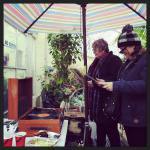
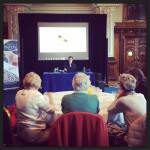
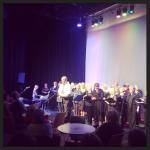
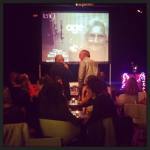
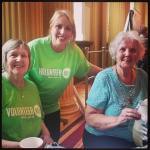



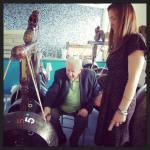
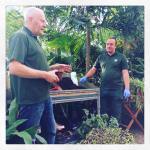
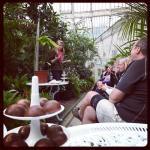

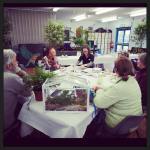

The thing about joy is, it’s terribly contagious. It kind of sticks to everyone it touches. I’ve watched the energy and enthusiasm spread through our older people over the last few weeks. I’ve heard them grow animated and laugh really hard as they tell stories about what they’ve been up to. I’ve watched their kindness stretch to embrace other, more isolated older people. And I’ve been a recipient myself. This month I’ve danced and been hugged, encouraged and complimented more than I have been in years. It’s been an awfully positive sort of month and I want to thank all the hundreds of individuals and groups who made it possible. Same again next year?


October 23, 2016
How I Got My Laptop Back
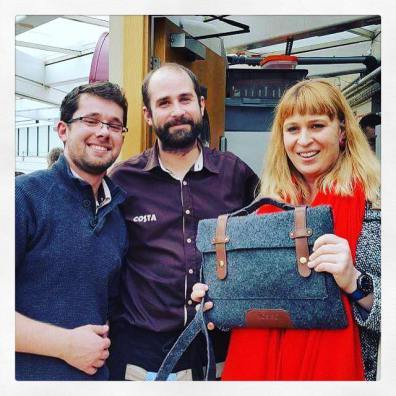
On Thursday morning I traveled from Belfast to Dundee to take part in Dundee Book Festival. I’m not the best at writing stories or even rough drafts on paper so I pretty much always carry my laptop with me. Thursday was no exception. I had one small pull-on suitcase in my possession, a carrier bag of books and my laptop case. I wasn’t anticipating any issues. The whole journey went really smoothly until I arrived at Dundee train station, stood up and realised I no longer had my laptop with me. I did a quick search of the carriage, then had to disembark before the train traveled on to Aberdeen.
A lot of bad things have happened to me in the last thirty odd years but I can honestly say that standing on the platform in Dundee, knowing everything I’d ever written, (and the drive on which it was all backed up), were MIA somewhere in Scotland, was up there with the worst moments of my life. If it hadn’t been for Billy and Willy, (honestly, not making these names up), the lovely station attendants who offered sympathy, reassurance and a direct phone contact with their mate in Waverley Station I think I might have fainted in sheer panic. I was very wobbly and fairly teary.
For the next two and a half days I made frantic attempts to penetrate the automated voicemail service at Scotrail’s lost property department, launched a social media campaign and spent hours just staring at the Track my Mac function on my IPhone, wondering why my computer wasn’t showing up anywhere. Dundee Book Festival was a really lovely experience but it felt like it was all happening to someone else. It’s fair to say I was a little pre-occupied. As most of you now know, I found my laptop on Saturday morning. I still can’t believe how fortunate I am and I’m very very thankful for the, literally, thousands of friends, friends of friends, and complete strangers who retweeted, reposted and offered advice and help. As Hilary, (who spent most of her weekend trying to keep me from having a nervous breakdown), said just after the joyful reunion with my life work, “it takes a village/mid-sized Scottish city to find a lost laptop.” So true. For those of you who’ve been asking, here’s the story of how I got my laptop back.
Events of Saturday 22nd October 2016
Hilary and I catch an earlyish train up to Edinburgh from Dundee on Saturday morning. I am feeling pretty hopeless about the situation and am planning to lodge a police complaint so I’ll have a crime number for the insurance claim. then hotfoot it to duty free at the airport to buy a replacement laptop at 15% off. I have already gone forty eight hours without writing. Writer years are like dog years so two days is like a month of abstinence and I am beginning to feel the withdrawal symptoms kicking in. We arrive in Waverley Station and go straight to Lost Property where the following conversation takes place. ME: “Hello, I was wondering if you could help me. I’ve lost my….” BORED ATTENDANT GIRL: “MacBook Air. Yes, I know!!!!! Your friends have been in!!!!” ME: “Which friend?” B.A.G. “Reels off a number of names I don’t even recognise.” It then transpires that so many of you and your friends have tried to help locate my laptop, Lost Property has been plagued with people calling in and ringing up to see if anyone’s located a laptop. (Thank you. Thank you. Thank you). The laptop is not there. The Bored Attendant Girl does not seem to hold out much hope of it ever being found, neither does she seem overly concerned by this even when I say, (as I have been saying somewhat melodramatically to anyone who’ll listen all weekend), “I’ve lost everything.” She suggests contacting the transport police if we can find them, they sometimes hang around outside Marks and Spencer’s. This, I think to myself, is not a reliable way of locating a police officer.
We go directly to the transport police. John, our policeman is a lovely fella, not a reader himself, but clearly impressed by my ability to give a very detailed incident report, (drawn from my extensive knowledge of Inspector Morse), and Hilary’s assurances that I am on the cusp of great fame as a writer, and most likely there will one day be a film made of this very event, featuring PC John played by anyone he fancies, perhaps even an A-List actor. PC John chooses Denzil Washington though later, on the telephone, says he’s thought about it and would be just as happy playing himself. I make a statement, do my best not to correct the policeman’s spelling and punctuation, and am given an incident number for the insurers. PC John say he will be able to easily track my movements through the station on Thursday because I am wearing a distinctive red scarf. I am irrationally pleased with my self for unconsciously aiding the police with their enquiries by wearing this bright red scarf. PC John says we should retrace my steps through the building and check everywhere, even places I’m sure I didn’t leave my laptop, just in case. I express a desire to be involved in any future house raids etc related to the retrieval of my laptop. PC John says I can be in charge of tazering if I so wish. I think he is joking, but I can’t be sure.
We retrace our steps through the station. I call in to the Costa Coffee where, on Thursday morning, I stopped briefly to buy an Americano before catching my train. I say, “I don’t suppose anyone found a laptop?” “On Thursday morning?” asks the barista, “in a gray case. It’s been here beside our dishwasher all weekend.” I feel as if I am going to faint for the second time in three days. I start to cry. Good crying, but slightly hysterical. Now there are three baristas and they are staring at me like I am insane. I am trying to say thank you but it is coming out as a big jumble of “life work” and “lost Bob Dylan novel” and “thank you” and “don’t any of you ever look at Twitter? Half of Scotland is trying to find this bloody laptop” and “all those short stories, hundreds of them.” Hilary is doing a happy dance round Costa coffee. Other customers have stopped sipping their cappuccinos to stare at us. The baristas give us hugs and hi fives and coffee, (the worst/best coffee I have ever tasted in my life). It is like a little party beside the till. I am happier than I was when I bought my house.
Ten minutes later I phone PC John and before I can say, “good news, we’ve found the laptop,” he says, “on the CCTV footage it looks like you left it in Costa.” PC John is clearly an excellent police man. It takes Inspector Morse 120 minutes to solve a crime. He’s managed to get to the bottom of the problem in less than a quarter of an hour. I don’t want to push it, but I hope I will still be allowed to taser a criminal or two even though I have now found my laptop.
Twelve hours later, at around one in the morning, my computer and phone simultaneously begin making a strange ring tone. Track my Mac wants to inform me that my computer is now in East Belfast. I’m not even cross about being woken out of my sleep. I’m far, far too happy.


Postcard Stories from Positive Ageing Month – Week Three
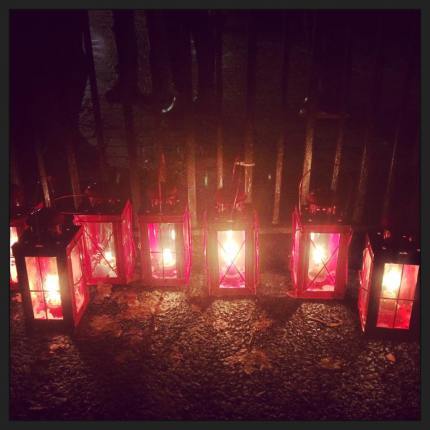
October 15th – Sunflower Bar
Lizzie Maguire
Bernadette was no longer attracted to Michael. This would not have been a problem if they hadn’t been married.
“I am no longer attracted to you,” Bernadette announced one evening during the advertisement break which separates the first half of Coronation Street from the second.
“Is it the bald spot,” Michael asked, “or my belly that’s put you off?”
Bernadette could not be so specific.
“Do you want a divorce?” he asked and she laughed at the very idea of this, for they were almost forty five years wed, and where would she find a second husband at her age?
“Tell you what,” said Bernadette, “if you done Roy Orbison’s voice every time you spoke to me, and I kept my eyes closed, I could probably stomach the idea of giving you the odd wee kiss.”
So Michael practiced doing the voice of Roy Orbison both speaking and singing ‘til he had it down to a smooth T, and Bernadette kept her eyes closed every time he came near her, and pictured the face of Harrison Ford, but with Roy Orbison’s voice, (for she found Harrison Ford a far superior fella in the looks department), and the pair of them muddled through for another few years.
October 16th – Belmont Road
Tiffany Sahib
Inside my grandmother’s head the memories have come loose and topple like library books slipping from their shelves. Yesterday is only just happening now and tomorrow, so far away, it can only be approached backwards with both eyes covered.
“Who are you?” she asks, and we don’t know if it us she’s misplaced or her own glad-faced self at fifteen or twenty.
My grandmother walks round the house touching every item of furniture lightly, as if she’s afraid the sofa, the curtains or the kitchen sink might, at any moment, bolt away from her fingers. Her eyes twitch like Christmas tree lights, flashing suddenly on and then blankly vacant. Only the piano does not struggle her. They sit together like old friends taking tea. She makes it sing. The piano returns the favour. She does not require sheet music, never has. Her fingers run the length of the keys, itching the grace notes out and, even after the piano is gone, still dance up and down any flat surface, anticipating music.
We do not need to test this miracle. We know her fingers still speak sense.
October 17th – City Hall
Sharyn Ruseckas
I should apologise for my behaviour earlier this afternoon at the annual Senior Citizens’ table quiz. Of course I know the name for a baby hare is a leveret –who doesn’t? Of course I can also correctly identify the Portuguese flag and pick Bruce Springsteen from a line up of newsprint celebrities. It was wrong of me to say, with forced confidence, “foal,” “Estonia,” “isn’t that your man from the Antique’s Roadshow?” This was a form of lying similar to theft and meant that our team did not win the annual Senior Citizens’ table quiz this year, or the resulting box of Black Magic chocolates.
We could definitely have won if I’d wanted to. But I didn’t.
In my defence let me say, I was much more intelligent than any of the other elderly ladies designated to our team. I once appeared on the popular quiz show, Eggheads. I am also a notable, local academic, (retired). I did not want to appear significantly smarter than the other ladies and perhaps end up holding the answer pen or be forced to represent our team in a tiebreaker situation. This was nothing to do with feelings of superiority on my part. It was all about fitting in.
October 18th – Palm House, Botanic Gardens
Cailin Lynn
Give a man a lantern on a darkened night and he will be inclined to sing carols though it’s ten weeks or more to the big day and we are not here, in the gardens, for Christmas or any such every year celebration, (birthday/anniversary/Halloween). We are here to read poems in a greenhouse with the lights out and the prayer candles casting their shadow souls on the cold glass.
“Magic,” we say under our breath for fear the clicking cockroaches will hear, or the damp-winged moths. For fear that, in naming the moment, some small and precious part of it will slip down the back of the plant pots and be lost.
“Special,” we say, much louder with our mouths, and our eyes, and clapping, hugging hands, because we are Belfast folk and “special” does not blush is in the saying. “Special” is something we can almost explain to the people who are not here, who do not know what it is like to be darkly through a glass, just for a moment, absolutely magic.
October 19th – Great Victoria Street Train Station
Margaret and Dianne Lowry
Remember the day you took the train home –all the way from Bangor with a change at Central Station- and somewhere outside Antrim could not hold your eyes up.
“I was only out for a minute,” you said, “a quarter hour at most.” Yet you woke up half an hour later, all the way through Ballymena and heading for the North Coast at a righteous clip. The panic of this was like a loud gong going off in your ears, both ears at once, and you wondered about pulling the emergency cord, though this technically wasn’t an emergency –no loss of life or close threat had occurred- but still, this was dangerous new train territory, chugging through the sheep green lands which split the difference between Ahoghill and Cullybackey.
Out you got at the very next stop, knitting in one hand, Marks and Spencer’s supper in the other, and hitched your way home with a man who delivered heating oil locally. Imagine the surprise of you, such a small, little lady with knitting, thundering up the cul-de-sac in an enormous lorry. All the neighbours’ curtains twitching, while we waited patiently for over an hour, at your usual station, missing the arrival of you.
These were the days before mobile phones.
October 20th – Waverley Station, Edinburgh
Jake Grubbs
Yesterday morning I left my husband on the train somewhere between Edinburgh and Aberdeen. Just outside Leuchers I realised that I’d misplaced him and hopped out at Dundee where the station attendants, Billy and Willy, (honestly, I’m not making this up), were most attentive.
“Phone Lost Property straight away,” said Billy, and wrote down the number for both Edinburgh and Aberdeen.
I phoned and discovered that it was almost impossible to speak to Lost Property until my lost item was twenty four hours missing.
“Please register your lost item online,” instructed the pre-recorded message. But there was no husband option in the drop down menu for commonly misplaced items, (phones, wallets, umbrellas, electrical goods).
“Have you fitted a tracking device to your husband?” asked Willy and I had to admit that I hadn’t. Neither had I backed up any of our best moments.
“Do people often hand in lost husbands?” I asked.
“50/50 chance,” said Billy, “the general public aren’t as honest as they used to be. Next time, make sure to back your husband up.”
I knew then that my husband had fallen into the lost fifty percent.
October 21st – Dundee
The Strand Arts Centre
Now I am old I no longer care what people think of me or how they place their hands across their mean little mouths making tiny shield when they whisper about what I am wearing, or not wearing, or carting round town in a shopping bag. I go to public events and scoop the free biscuits straight into my handbag. I don’t event wait ‘til no one is looking. I lift the plastic cutlery from the chip shop counter –great handfuls of disposable forks and spoons-to save on the washing up liquid. I go to literary readings early because they are usually held in warm places. I fall asleep before the reading begins in earnest. (This is the best way to enjoy a literary reading). Sometimes I snore. On other occasions I do not move so much as a half inch for the entire duration of the reading and I know the people on stage are wondering if I have died on my stackable plastic seat, sitting upright with a handbag full of custard cream clutched against my lap. I know they are also wondering if they should stop reading their poems and daft short stories to check if I am dead or not. They never do. Someday I will be dead rather than sleeping and all my stolen biscuits will most likely go to waste.


October 19, 2016
Magical Candlelit Palm House Reading




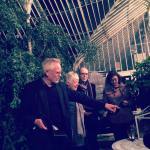

Last night we finished up the first part of our Tropical Ravine writing project (Writing the Ravine), with a beautiful candlelit celebration in the Palm Houses at Botanic Gardens. Lots of the participants from the five community writing workshops which took place back in spring joined us at the gates of Botanic Gardens for a lantern parade through the park. Then, we gathered in the Palm Houses, right in the middle of the exotic plants, for a really magical reading of the stories and poems written by these participants. It was such a special wee evening and Cailin Lynn -Tropical Ravine outreach officer- deserves enormous amounts of credit for turning the Palm House into a truly magical space and making everyone feel so welcome. During the project poet Emma Must and I had the privilege of facilitating writing workshops with various groups who had memories of the Tropical Ravine and gardens. The majority of these participants had little or no experience with creative writing and so we were incredibly proud to hear many of them stand up and read their wonderful pieces last night. Here are a few photos from what turned out to be one of the most memorable readings I’ve ever been part of and a fabulous piece co-written by the members of the Skyways Club.
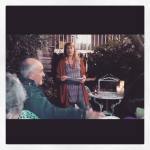
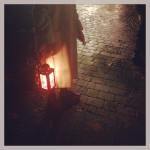


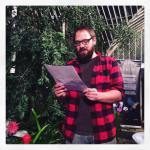
“Smells”
In the Botanic Gardens
we can smell nice, flowery smells
all mixed up with bad, river smells
and the burnt rubber smell of cars
coming up from the Embankment.
The smell of pollen, cut grass and manure
which you can also smell in the country.
Lovely, sugary smells from the ice cream van:
strawberry, vanilla, chocolate chip.
The students on the lawn
who are meant to be studying
and instead, smell of drink.



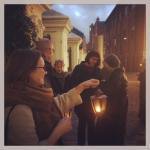



October 15, 2016
Postcard Stories from Positive Ageing Month : Week Two

October 8th – Botanic Gardens
Erin Kelley
During the summer holidays of my university years I took a job as companion to an elderly lady who lived on the Malone Road. This lady was in her early nineties and, due to her inability to climb even one of the twenty something steps between her hall and landing, confined to the first floor of her home. She slept in a hospital bed situated in the study and spent her days upright, or occasionally reclining, in a large La-Z-Boy armchair which I’d positioned in front of her television.
Her name was Margaret. She would not permit the use of any derivative: (Maggie, Meg, Marge). She wished to be read to, and paid me to do so. A home help had been hired to attend to all her other needs. Money, as you can imagine, was not an issue for Margaret.
“What would you like me to read you?” I asked on my first visit and Margaret replied, “all Agatha Christie’s crime novels in chronological order.” She did not say please.
I had a working library card. I borrowed ‘The Mysterious Affair at Styles’ and began reading, finding myself affecting a kind of Hugh Grant Englishness when tackling the dialogue. We completed the sixty sixth and final novel halfway through the summer of my third university year. The next week Margaret died. This was very convenient as we had nothing left to read and I, having recently graduated, was in the market for a proper job.
October 9th – Belmont Road
Deirdre Robb
There is a hole in the dining room floor from where my late wife once leaned too heavily on her stiletto heels. I can picture the incident now. Maureen coming into the room suddenly from the hall, her hair caught up in a kind of hill and held together with gallons of Silvikrin hair lacquer. Her going out dress: the one without sleeves. Her mother’s pearls swung low around her neck. The smell of Charlie perfume arriving in the room a few seconds before her. I can see it all in detail; smell it, even still. I, in the kitchen doorway, glass of whiskey in hand, and cigarette, the year being 1973. The way Maureen stepped abruptly back, leaning hard on her heels as if struck by the shock of me, dressed for staying in rather than heading out. The twiggy crunch of wood, splintering and, afterwards, the sound of her raised voice, like a hand coming down hard against my cheek.
Sometimes the toe of my walking stick catches on the hole in the dining room floor and I think about my late wife and all those evenings when she left the house without me in high stiletto heels and black, taxi cabs. And I tell myself to regret nothing. Yet I still keep catching on the hole she left behind.
October 10th – Andersonstown Leisure Centre
Diana Champa
“We can manage,” they said. “We are made of stronger stuff than the old folk on the Mainland.” And so they were. But the morning after the last cup of tea in Ireland had been poured none of the older ladies could muster any such triumphalism.
“Without tea,” they said, “we won’t be able to talk, and without talk, how will we be able to laugh or properly cry, or keep one minute ticking into the next? How will we ever know who we are without a cup of tea to warm it out of us?”
Down they went, into the little streets and great, rifling bins and hastily abandoned bin liners for used tea bags and loose leaves; anything which could be squeezed or heated or stewed for a single drop of liquid truth. The worst of them tried coffee and found it wanting. The best refused to try anything, sat themselves down at their kitchen tables and quietly wept. “Punjana. Barries. Tetley. Nambari,” they howled, invoking the names of all the local gods with no small effect.
Thereafter, the old people of Belfast seemed older, duller, more inclined to stay home and contemplate the walls. They were like cars or other motorized vehicles suddenly run out of petrol.
October 11th – Grosvenor Hall
Conor Copeland
Lately I have begun to pull a small suitcase behind me every time I leave the house. It is black in colour, (for black goes well with almost every outfit I own), and roughly the size of a microwave oven – the kind of suitcase which counts as hand luggage on Easyjet, (though Ryan Air probably wouldn’t allow anything so substantial to ride up top).
I have not always pulled a suitcase behind me. As a child I carried nothing but my hands and, where my hands would not suffice, cardigan pockets. As a young lady I graduated on to handbags and watched these handbags swell to matronly proportions as I progressed towards middle age. Then I made the move to tote bags, Tesco carriers, a shopping bag on wheels in jolly, red tartan, until finally even this was too small to contain everything they expected me to carry and I purchased my pull-on suitcase with its stout, little wheels and it extendable handle and its wrap around zipper which can be unzipped to allow for an extra inch or two of excess baggage.
October 12th – Templemore Avenue
Ann-Marie Warren
By the time the youngest of Kathleen’s three daughters turned forty five she was finally able to accept that she would not be a grandmother. This was a tremendous disappoint to her and, an even greater disappointment to discover, after contacting the relevant authorities, that grandchildren could not be adopted or even fostered like regular children.
“What if I was willing to pay a small fee?” Kathleen asked.
The relevant authorities did not reply directly but asked her to leave the premises immediately and never return.
Kathleen was devastated. While she’d never entertained a specific notion for children, grandchildren had always appealed to her for they seemed to possess all the benefits of children yet required significantly smaller Christmas and Birthday presents.
She got out her knitting needles and, following a pattern entirely made up in her head, knit three fat, little grandchildren and a series of grandchild-sized jumpers for them to wear. She called the grandchildren Stephen, Richard and Kathleen, (who had plaits and was named after herself). She made them watch The Antiques Roadshow with her, and play Connect 4, and sit outside in the early afternoon sunshine with the cat. And, when Stephen got lippy over a second episode of The Antiques Roadshow, unraveled all three of her grandchildren and knit them into cushions.
October 13th – Palm Houses, Botanic Gardens
Jim Wilson
Alan the gardener is both showing and telling us how to take a cutting from a big plant.
“Cut the stem neatly at the first nodule,” he says. “Peel away all the excess leaves. Stick it in some muck and wait a week or two. It can’t fail to root.”
Everyone watches. Everyone has a go for themself, holding the professional secateurs like they might, at any second, bite.
“What sort of plants do you grow?” asks the older lady next to me.
“Artificial plants,” I say, “from Ikea.”
She grows one hundred and twenty two different varieties of cherry tomato. She has more than one greenhouse. She does not own a single plastic plant from Ikea. I feel sorry for her.
I have a go with the secateurs. I do not cut my own finger off. This is a relief to me. I plant my little slip of a seedling in three inches of muck.
“That plant’s indestructible,” says Alan the gardener. “Even you won’t be able to kill it.”
I picture myself six months from now with real plants instead of fake ones. I feel uncharacteristically optimistic about gardening. I walk out of the Palm House, trip over the step and drop my plant. The four leaves of it look up at me from the footpath. They are ruined. They are wishing they could have gone home with the tomato lady.
October 14th – City Hall
Elizabeth O’Callaghan
“We need to know where you are, Mum,” say the children. “We need to be able to get the hold of you in an emergency.”
Emily knows that the children have got this the wrong way round. They anticipate that it will be her experiencing the emergency –falling, slipping, taking a stroke in the check out line at Poundland- and they, who will be contacted at the most inconvenient moment.
Emily consents to carrying a mobile phone.
She keeps it in the zippered section of her handbag and takes an absolute age to get to it every time it rings. Her ringtone is ‘Mamma Mia’ by the Swedish pop group, ABBA. At first Emily finds this music jolly. After the fifth or sixth call it begins to feel like eating too much chocolate every time she hears it. She means to ask her grandson how to change the ringtone and always forgets.
Emily forgets to turn her phone to silent in the cinema. She rings people –the doctors, her youngest son, Susan who does her hair once a fortnight- accidentally with her hip and though they are patient in their words, their voices are thin as rubbed paper. She does not know her phone is also a camera and takes picture of her own cheek. Afterwards she wonders why the screen is full of soft, petaled peach.
She says, “I don’t really want a phone,” and the children say, “we need to know where you are, Mum.” Emily resists the urge to say, “right here, where I’ve alwys been, if you only took the time to visit.”


October 9, 2016
Postcard Stories from Positive Ageing Month : Week One
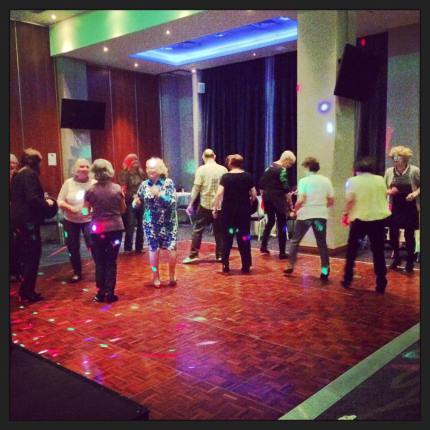
October 1st – Belmont Road
Lesley Martin
After Eddie died the house still felt full of him: his reading glasses on the kitchen bench, his good coat in the hall, his shoes, his books, his toothbrush by the sink, head inclined towards mine, as if to say, “so what are you going to do about all the stuff I left behind?”
“Pack Daddy’s clothes up,” said our children and the older of our grandchildren, “we’ll get rid of everything for you. It’ll be easier when you’re not reminded of him every time you turn round.”
But, losing a husband, like acquiring a husband, was something I had to do myself. I packed Eddie into dozens of carrier bags, making a mix up of his shorts and jackets, his paperback novels and flat caps. I left little bits of him all over Belfast with Age Concern and Marie Curie, Save the Children and several of those nameless church shops with cardboard signs in the window.
“I’d like to make a wee donation,” I said and gave all those smiling volunteers a manageable portion of my loss.
I could have taken everything to the charity shop across the street and been done with it. But I have seen those glum-faced creatures dragging their three bin liners full over the threshold. And I have occasionally seen them cry. And I have also seen the way the volunteers look at them- all damp sympathy and “sorry for your loss,” and I could not have carried something that heavy, all at once, on my own. Better to let go one carrier bag at a time.
October 2nd – Botanic Gardens
Linda Knox
That winter it rained even more than usual and I often accepted a lift home from the town undertaker whose funeral parlour sat directly opposite my office. He was an elderly man; fifty years or more in the trade, and greatly respected round town.
“It’s no bother,” he’d say. “Sure, I’m going that direction anyway,” and occasionally remind me that the flat above the embalming room was still available for rent. “It’s lovely and cool in the summer,” he’d say, and we’d both sit there in silence, trying to recall the last time a local summer had been hot enough to require cooling.
Out of hours the undertaker did not drive a hearse. Instead, he drove a stately BMW at ten miles an hour, never once breaking the funereal speed limit so the half mile home took almost fifteen minutes. This was long enough to suck a Werther’s Original all the way down to the nib of itself and narrate the obituary column in its entirety, with anecdotes, (where appropriate). To wonder what was different about the undertaker when he drove me home in his BMW and, only afterwards, realise it was his lack of tie and top hat tucked respectfully under arm, the way he’d laughed once or twice at small jokes, his sad, soft face not knowing what to do with such joy.
October 3rd – Shankill Road
The Carsons
This morning you are making a Faberge egg in the back room of a community centre, situated at the bottom of the Shankill Road. You are very carefully lifting the shell of a goose egg from the table, holding it in the cup of your liver spotted hands, turning it this way and that for a perfect beginning point. You are consulting magazines, looking at pictures on your neighbour’s phone, scrolling through the soft bank of your memory for a single inspiring thought, until something clicks and you are off with the PVA glue and the opalescent paint, the thin strips of sequined ribbon and individual diamante stars, attached with UHU glue.
“What’s it going to be?” I ask, and you look at me like I just came up the Lagan in a thin-shelled bubble.
“An egg,” you say, knowing full well that a thing cannot be anything but itself, no matter how many colours it is painted. “But inside the egg,” you continue, “I’ll put something really fancy and beautiful.”
You hold the shell of it like it is made of sheet ice or hope or something equally fragile. “They’re wild easy broke,” you say; this being a lesson hard learnt and not particular to Faberge eggs.
October 4th – Belfast City Hall
Anne Weinhold and Chloe Thwaites
No one has thought to ask her if she ever came to fancy dances at the City Hall. But she has still come across the rotunda -her left ear hearing-aid, tinning like a struck chandelier- to tell us that she once came to fancy dances at the City Hall, with her sister, (who was a foreign language student), and a host of shiny buttoned naval officers, and other young ladies of similar standing and persuasion, though none so well turned out in lemon, yellow tulle, (a bridesmaid’s dress altered by the lady across the street, who was deft as anything with needle and thread). None so tickled pink to be asked.
No one has thought to ask her about the white coats of the naval officers or the starched, white, civic tablecloths, or the white, linen handkerchief squared and tucked inside her matching clutch like a clean, white secret. But, here she is, standing in front of us, telling it all anyway, twirling her imaginary skirts while she speaks, as if the whole pale, yellow dream of it is coming back to her like winter sunshine whispering through the clouds.
October 5th – Dublin
Joan Weber
My late grandmother worked all her days in a linen mill and, in her retirement, kept brown chickens in the back yard and never ventured any further South than Belfast, (though once she chanced a day trip to Ayr, Scotland, returning on the early evening ferry, for there were chickens to be got in, and church the following morning). Twice she dined in hotels -my father’s wedding, and latterly, my brother’s- pronouncing the word hotel to rhyme with bottle, or perhaps throttle. No need had she for foreign climes though there were close kin in Canada and other parts of North American who would have had her if she’d asked. The Free State she dismissed with a blunt frown, “sure, you’d not be safe down there with the Northern plates on.” And, when I moved for a number of years, to Oregon in the Pacific North West I might as well have pitched my tent on Pluto for all the notion she had of it. My grandmother’s world was five miles square and orange by default, but she still liked to receive postcards from abroad: thimbles and other such trinkets from Continental holidays she’d never take. She kept them on the mantelpiece next to my grandfather’s retirement clock which we inherited after she died.
October 6th – Clayton Hotel, Belfast
Shelley Tracey
You have arrived at the disco in a suit and tie. You are eighty seven years old. Your eyes are like dark, little raisins. They smile independently of your mouth. You say the word ‘disco’ hesitantly in the same way my mother says ‘chorizo’, ‘hummus’, ‘Americano’, trying the new words out for fit and flex. You dance with your wife/alone/in your seat, fingers drumming on the table top so the wine in your wine glass ripples and shrinks away from itself as if warning of some imminent earthquake. You really let loose on ‘Build Me Up Buttercup.’
You stop to thank everyone on the way home. “Thank you.” “Thank you.” “Thank you all for a wonderful evening.”
Your tie is balled up in your blazer pocket, shirt collar open to let your neck breathe, and I ask, “what happened to your tie? Were you dancing too hard?”
You reply, “no I was the only man here in a tie, so I took it off.”
And I say, “that’s a shame. I wish men still wore ties to dances.” I use the word dance because disco is not the kind of thing you say lightly to an eighty seven year old man with a silk hankie triangling out of his breast pocket.
October 7th – Sally Gardens
Clinton Kirkpatrick
Visiting Senior Citizens’ Clubs in Belfast:-
They are quick to point out that things are not what they used to be. People aren’t half as friendly. Nobody goes to tea dances any more. The buses don’t run as often as they once did. Everything is getting worse. They offer tea and occasionally Rich Tea biscuits, fanned out round a saucer. They assume you take sugar. They are called Betty/Maureen/Joan/Jean/Margaret. They play bingo at least twice a week and sometimes win a pound or two, though never enough to cover the taxi home. They used to knit but now they can’t on account of arthritis/hip replacements/diabetes/not being arsed to do anything but watch TV. They watch ‘Real Housewives of Beverly Hills’ on a tiny TV set wedged between the fireplace and the glass cabinet where they keep their Royal Doulton ladies. They say, “ha, ha, ha, could you get me a man at the tea dance?” and quickly follow it up with, “I had a man once and now he’s gone. I wouldn’t be bothered with breaking another one in. Not at my age.” Sometimes they sound like chickens enclosed in a small space. They offer more tea, maybe a wee sandwich from a tinfoil wrapped bundle. They leave before it gets dark. They have no confidence in the buses.


October 8, 2016
Your Friends in the North

I began drafting this blog in my head on the last train home from Dublin on Wednesday evening. I was en route back to Belfast after a fabulous launch for The Glass Shore hosted by Hodges Figgis. If the Enterprise WiFi, (a phenomenon oft-cited but rarely experienced), had actually been working or, i’d had energy left for anything beyond the consumption of a jumbo KitKat, I might have written it there and then. I’m glad I waited. Everything I want to say in this blog has grown legs since Wednesday. All the nice sentiments I intended to write about, just to make us feel warm and fluffy inside, now feel less fluffy, more important, more like things we may be required to lean upon in the months to come.
It’s been a very long week. Undoubtedly there have been highs, but there have also been some really tough moments.
I’ll begin with a high note. On Monday evening an enormous amount of people turned up at the Ulster Museum to launch The Glass Shore, (an anthology of short stories by women writers from the North of Ireland). It’s fair to say we’re very proud of this wee book. Just over a year ago Sinead Gleeson edited a fantastic anthology of Irish women writers called The Long Gaze Back. For many of my friends and colleagues reading these beautiful stories and attending events and talks associated with the book catapulted us into a different mind space where, as Northern writers we began to ask, why we didn’t have such an anthology and why our voices often seemed to go unheard. Sinead, being the powerhouse of a woman that she is, heard us, more importantly, actually listened to us, and began working tirelessly to compile the collection of stories which would very quickly become The Glass Shore. We are extremely grateful for both the book and the fact that we have such a hurricane of a woman championing our writing throughout Ireland and beyond.
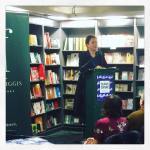
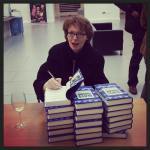


For me, personally, The Long Gaze Back was a really turning point in my journey as a writer. It forced me to question my own reading and writing prejudices and blind spots. Growing up Protestant, Presbyterian in rural Northern Ireland I’d consumed vast amounts of Irish literature but cannot, with hindsight, recall a single book or story where I read an account of something even roughly approximating my own life experience. I am, by default, a magic realist and had actually reached my twenties still carrying around the mistaken belief that there was nothing mystic, no wonder, beauty or intrigue worth exploring in the rural Protestant experience. No one else, (that I’d found), had written about the dark humour of Presbyterian funerals, the ritual and tradition of our Harvest suppers, our Christmases and our soggy Sunday School outings to Portrush, the old people, (as Dolmen-like on the outskirts of Ballymena as anyone John Montague ever encountered), the weekend caravan parks and runs to the North Coast, the particular sadness of provincial Ulster suburbia with all its double garage and conservatory obsessions. Eventually, I’d made the assumption that these experiences -my experiences- weren’t worth writing about, didn’t carry the same magic and mystery as a Catholic wake or a knees up with the lads from the Shipyards. I wasn’t sure if no one had ever bothered to write stories about my wee world, or whether they’d been lost, or there was some sort of unspoken assumption that nobody was interested in reading about us.
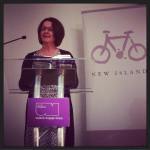


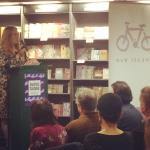
It took years for me to realise that if these stories didn’t exist it was up to me to start writing them; to present my experience in a way that was truthful, and compelling, and proud of where I came from.
I quit writing stories set in America about people I’d only ever encountered in books and films and I began to write what I knew, albeit a little slant because I’m still a magic realist at heart. I wrote about the old people I grew up with and the things I’d overheard sitting at their feet. I wrote about places so familiar I’ll never quite escape them. I wrote with my voice, and my humour, and my odd wee ways of saying things: a mish mash of inherited American fiction and Ballymena phraseology and the King James Bible, which will always be my first and loudest literary influence. I wrote stories about middle class people, because much as I’d sometimes like to have vast amounts of money, or appropriate the romance of the working classes, I am painfully middle class, quite reserved and often awkward in my own skin. I wrote about the endless wrestling match between faith and doubt and Protestant guilt, (yes, it is a thing too), which many of my friends face as they try to reconcile the old ways they’ve learnt from their parents with a world which doesn’t have much interest in religious belief. I wrote about all these familiar things and filtered them through the lens of my overleaping imagination, which I like to believe was honed during a childhood spent sitting still through 45 minute Calvanist sermons.
People read my stories and they seemed to like them, or at very least, they did not disregard them. This felt like a long overdue settling into my own skin. It felt like being invited to come and sit at the table with all the other storytellers. I’m pretty sure this journey is also part of the reason I’ve decided to root down here in Northern Ireland and finally shrug off my wanderlust. I’ve grown awfully fond, proud even, of my identity as a woman from this part of the world. Many of the stories in Children’s Children, particularly those which explore Protestant culture against a backdrop of contemporary Northern Ireland, simply wouldn’t be if The Long Gaze Back hadn’t provoked me to think about who I am and how it impacts what I write. For this I am very thankful. It is a good thing to be heard, but an even better thing to feel confident in what you are writing even when no one is listening.
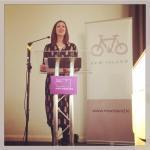
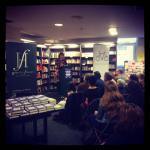

On Monday, at the Ulster Museum launch, I was asked to read a short extract from my Glass Shore story. I wasn’t prepared for how emotional the experience would be. The room was full of smiling faces, (this, in itself, is quite unusual for a literary event where most audience members usually look as if they are mildly irritated or tottering on the edge of a nap). Some wonderful women writers from the South had travelled up from Dublin, just to support us. This was the closest thing to feeling like I am part of a team I have felt since stepping down from the Under Sixteens hockey team in 1995. Poets, playwrights, musicians, readers, friends and artists had all taken time out of their busy schedule to celebrate the moment and, when Anne Devlin and I travelled down to Dublin on Wednesday for the Southern launch, the room was equally full of supporters, friends and writers who were genuinely delighted to see our work in print. Martina Devlin, who gave a wonderful speech at the beginning of the Dublin launch said, “The Glass Shore brings North closer to South and South closer to North. We’ve a great deal to say to each other. By we, in this context, I mean women.”
Which brings me to the point I’ve been mulling over since the last train home on Wednesday evening. Yes, The Glass Shore is a celebration of women writers from the North of Ireland. And, yes, it is long overdue and unfair that our voices haven’t been fairly represented in the past, and we have every right to crack open the sparkling wine and kick our heels up and enjoy the moment. But this book cannot just be a win for the fifteen living writers included in its pages, or even the Northern women currently writing and reading who will be encouraged to see their experiences, their voices represented here. This book, must bring North closer to South. It must be a celebration for all of us women who live on this island, who want to speak authentically, openly, passionately, and dare I say it, fiercely, about our experiences. Prose writers. Poets. Playwrights. Musicians. Artists. Film makers. Dancers. I don’t actually care what medium people turn to as long as the art is good and fearless and invested with something of ourselves. In order to move forwards we must be united. We need to champion each other, genuinely revelling in other’s successes and offering genuine consolation when other’s experience disappointment and difficulties. We must hold each other accountable to producing a remarkable standard of work because I think we all, deep down, know what what we’re truly capable of. We must strive for solidarity. Surely there are enough people trying to undermine the arts community in Ireland without us taking pot shots at each other.
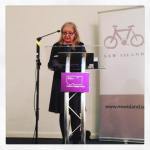
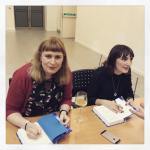

The second half of my week has been hard. As many of you are beginning to gather some really awful things have happened with my publisher over the last few years. Many of us have been treated unjustly, experienced real isolation and felt like our voices are not being heard or properly honoured. This isn’t the platform to go into details. I’m sure the details will come out later in the week. However, while it would be so easy to feel demoralised and alone in the situation I’m currently facing, in the last twenty four hours I’ve been absolutely astounded/encouraged/humbled by friends and complete strangers in the literary community who’ve spoken up in solidarity and support for us. Publishers. Journals. Writers. Readers. Agents. Every voice is appreciated. It makes everything a hell of a lot easier to know none of us are going through this alone. It makes me realise that the solidarity, the closeness and community which exists between North and South is far from fluff and sentiment. It’s the difference between a tiny whisper and a loud roar.


October 1, 2016
Best. Month. Ever.
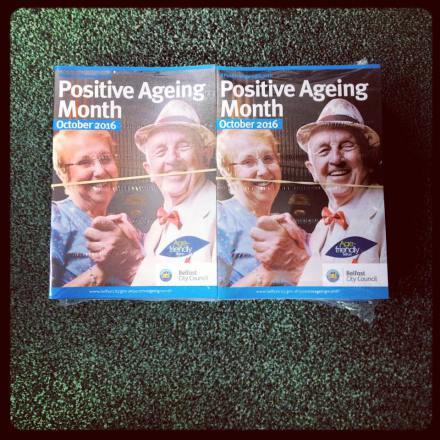
It’s fair to say October’s going to be a bit of a crazy one. I’ve an anthology launch this week, a new novel to edit, I’m selling my house, looking for a new job and heading over to Dundee Book Festival to eat haggis and hang out with Peggy and all her bookish, Scottish friends. Exciting as all this is, the thing I am far and away most excited about is Positive Ageing Month.
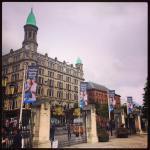
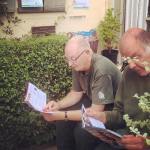

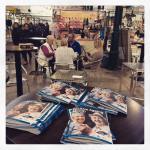
Most of you know I love older people and I really love Belfast so having a blank canvas and a whole month to programme events across the city for our over 60s has been pretty much the best job I could possibly think of. We have over 200 fabulous events taking place all across the city: chocolate tasting in the Botanic Palm Houses, an outing on the train to Coleraine, concerts, film screenings, craft workshops, walks, talks, a fabulous bingo and drum circle event, (Bingo Bongo), many, many tea dances, Slipped Disco, (a 60s and 70s disco for older people), pub quizzes, gardening classes, exhibitions, keep fit and cycling, plus guided tours of some of Belfast’s best buildings. I’m actually getting exhausted just thinking about how many brilliant events I get to go to this month. We’re partnering with lots of Belfast’s best venues, cultural and arts organisations so anyone who comes along and enjoys an event should have loads of opportunities to plug into an ongoing programme.
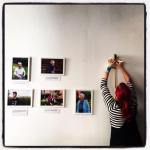
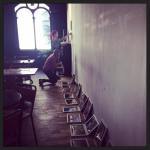
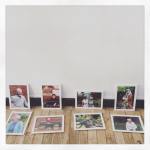
We’d love to see all our events packed out with older people enjoying themselves, making new friends and getting the very best of Belfast but we could do with as much help as possible to get the word out. If you’d like to help, grab one of our brochures from the City Hall or the Welcome Centre and pass it on to one of the older people in your life. You can also download the whole programme at www.belfastcity.gov.uk/positiveageingmonth There are also quite a few of the events which aren’t just for older people and it would be great if some of you wanted to join us, even better if you’d like to bring an older person with you. For those who are a little more isolated or reluctant to leave home, the offer of some company or a lift can often be the difference between coming to an event or staying in by themselves. Older people generally love getting to spend time with people who are younger so we’d love it if our events could be as intergenerational as possible.
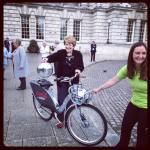

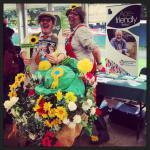
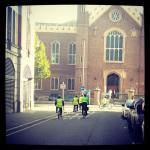
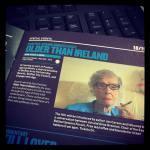
We could also do with some help tweeting. More older people than you’d think are using social media and it’s also a really great way of connecting with children and grandchildren who can pass the word on. We’d also love other people to hear about how brilliant P.A.M. so blog and tweet and pass on Facebook posts and help let people know there are lots of positive things about being an older person. We’re using hashtag #PositiveAgeingMonth If you see any tweets coming through we’d really appreciate a retweet. If you’re a photographer and have some spare time we’d also love as many good quality photos of the month as we can get, so give me a wee shout and I can arrange for you to drop into one of our events. Finally, I’ll be using the month as an excuse to write Postcard Stories about older people which you’ll be able to follow here on the blog. (#PostcardsFromPAM).

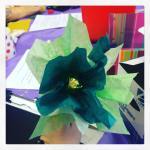
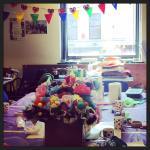
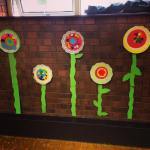
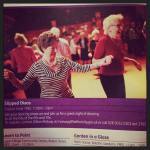
We’re really excited about Positive Ageing Month. It’s an amazing feeling to be able to offer the older people of Belfast a really quality programme of events. We think they deserve to be honoured, celebrated and included not just in October, but all year round. If you think you could help in any way please get in touch. I’ll see you in November, slightly more exhausted but no doubt full of wonderful stories.





